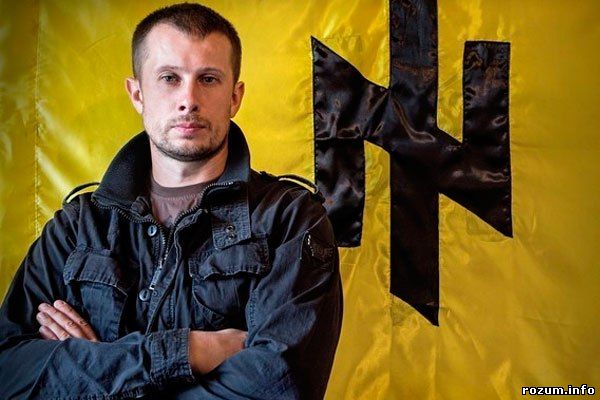 In view of a recent statement by two US congressmen on the "Azov" regiment as a "neo-Nazi paramilitary militia" and a failed myth of the undisputed Western support for Ukrainian rightists to which they presumably owe their strength and popularity in Ukraine, it's time to ruin probably the most persistent myth of an anti-Ukrainian Kremlin's propaganda regarding the funding of the "Azov" regiment, "Right Sector" and other right-wing units and organizations by a "Jewish oligarch" and a governor of Dnipropetrovsk region Igor Kolomoisky. In view of a recent statement by two US congressmen on the "Azov" regiment as a "neo-Nazi paramilitary militia" and a failed myth of the undisputed Western support for Ukrainian rightists to which they presumably owe their strength and popularity in Ukraine, it's time to ruin probably the most persistent myth of an anti-Ukrainian Kremlin's propaganda regarding the funding of the "Azov" regiment, "Right Sector" and other right-wing units and organizations by a "Jewish oligarch" and a governor of Dnipropetrovsk region Igor Kolomoisky.
 Firstly, not all realize the fact that Igor Kolomoisky no longer occupies a post of the governor of Dnipropetrovsk region: he was fired by the President of Ukraine Petro Poroshenko on March 25, 2015, largely due to the scandal connected with Kolomoisky's PrivatBank's share in the oil company "UkrNafta," and had no right-wing "private army" that would like and could help him to save his position and influence. That's why accusations of being funded by "rich and powerful Jews / oligarchs," Kolomoisky in particular, which are often addressed to the "Azov" regiment and other right-wing Ukrainian formations, sound especially anachronistic and annoying. Nobody bothers answering them; such claims are usually ignored or deleted as the paid commentaries of the Kremlin's lobbyists and bots. However, the fact that even the friends and allies of Ukraine still wonder about the same issues or at least the origin of this myth made us reconsider our attitude and provide our followers with the necessary explanations. Firstly, not all realize the fact that Igor Kolomoisky no longer occupies a post of the governor of Dnipropetrovsk region: he was fired by the President of Ukraine Petro Poroshenko on March 25, 2015, largely due to the scandal connected with Kolomoisky's PrivatBank's share in the oil company "UkrNafta," and had no right-wing "private army" that would like and could help him to save his position and influence. That's why accusations of being funded by "rich and powerful Jews / oligarchs," Kolomoisky in particular, which are often addressed to the "Azov" regiment and other right-wing Ukrainian formations, sound especially anachronistic and annoying. Nobody bothers answering them; such claims are usually ignored or deleted as the paid commentaries of the Kremlin's lobbyists and bots. However, the fact that even the friends and allies of Ukraine still wonder about the same issues or at least the origin of this myth made us reconsider our attitude and provide our followers with the necessary explanations.
 If "Right Sector," which after the Maidan revolution moved its headquarters to the city of Dnipropetrovsk region and earlier had to make a series or remarks on its friendly attitude to all national minorities, including Jews, on condition of their assistance to the cause of Ukrainian national liberation and strengthening, not undermining Ukrainian state, as well as due to the unsanctioned action in support of Israel by one of its activists Andriy Denysenko and the episodic cooperation with Boryslav Bereza, ethnic Jew, who was eventually fired due to his left-liberal exposing the "fascistic attitudes" of some of his colleagues, was labeled in the pro-Russian right-wing communities as the "Jew Sector" (the leader of Right Sector Dmytro Yarosh said in one of his spring interviews that he met Kolomoisky only several times and has never considered him an authority), the "Azov" regiment was denigrated as "Kolomoisky's puppet army" later, after the "little black men," who afterwards became the "Azov" battalion, subsequently regiment and in the future, probably, will be converted into the brigade, started their anti-terroristic operation in the south-east Ukraine, Donetsk region, which presupposed passing through Dnipropetrovsk region. If "Right Sector," which after the Maidan revolution moved its headquarters to the city of Dnipropetrovsk region and earlier had to make a series or remarks on its friendly attitude to all national minorities, including Jews, on condition of their assistance to the cause of Ukrainian national liberation and strengthening, not undermining Ukrainian state, as well as due to the unsanctioned action in support of Israel by one of its activists Andriy Denysenko and the episodic cooperation with Boryslav Bereza, ethnic Jew, who was eventually fired due to his left-liberal exposing the "fascistic attitudes" of some of his colleagues, was labeled in the pro-Russian right-wing communities as the "Jew Sector" (the leader of Right Sector Dmytro Yarosh said in one of his spring interviews that he met Kolomoisky only several times and has never considered him an authority), the "Azov" regiment was denigrated as "Kolomoisky's puppet army" later, after the "little black men," who afterwards became the "Azov" battalion, subsequently regiment and in the future, probably, will be converted into the brigade, started their anti-terroristic operation in the south-east Ukraine, Donetsk region, which presupposed passing through Dnipropetrovsk region.
The concrete pretext for spreading these rumors was the conflict of Igor Mosiychuk, the former Press Secretary of the "Azov" battalion, currently MP of the "Radical Party" headed by Oleg Liashko, with the "right hand" of Igor Kolomoisky Borys Filatov in the end of July of 2015.
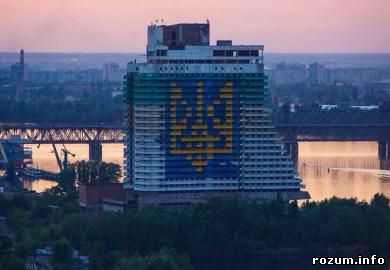 To understand the context of this quarrel, one has to take into account that the attitude of Ukrainian people, army and volunteer battalions to the assistance of Dnipropetrovsk regional administration was positive. Everyone realized that by supporting Ukraine Igor Kolomoisky also or above all protected his own business interests, yet everyone appreciated his contribution to preservation of the territorial integrity of Ukraine, as well as people's lives and infrastructure of Dnipropetrovsk region by preventing the subversive activities of the pro-Russian separatists in the region, which became the frontier that separated Kyiv-controlled territories from the ones occupied by the pro-Russian forces. It should be also noted that in Kolomoisky's place could be any other oligarch who would have to face the same choice regardless of his nationality. If he refused to support Ukrainian statehood or played both ends as a rich Donetsk businessmen Rinat Akhmetov, it would be harder for Ukraine to resist the advance of Russian-backed separatists and Russian army, but not impossible, since Dnipropetrovsk region has always been firmly pro-Ukrainian regardless of the political course of the authorities. To understand the context of this quarrel, one has to take into account that the attitude of Ukrainian people, army and volunteer battalions to the assistance of Dnipropetrovsk regional administration was positive. Everyone realized that by supporting Ukraine Igor Kolomoisky also or above all protected his own business interests, yet everyone appreciated his contribution to preservation of the territorial integrity of Ukraine, as well as people's lives and infrastructure of Dnipropetrovsk region by preventing the subversive activities of the pro-Russian separatists in the region, which became the frontier that separated Kyiv-controlled territories from the ones occupied by the pro-Russian forces. It should be also noted that in Kolomoisky's place could be any other oligarch who would have to face the same choice regardless of his nationality. If he refused to support Ukrainian statehood or played both ends as a rich Donetsk businessmen Rinat Akhmetov, it would be harder for Ukraine to resist the advance of Russian-backed separatists and Russian army, but not impossible, since Dnipropetrovsk region has always been firmly pro-Ukrainian regardless of the political course of the authorities.
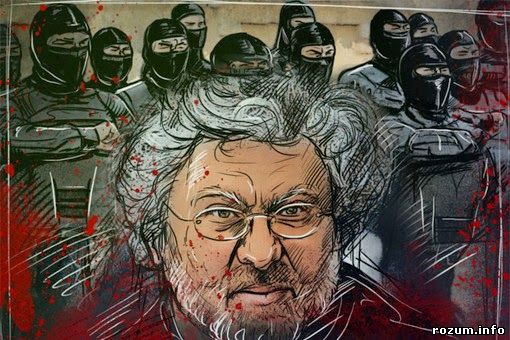 Thus helping the Ukrainian military, volunteer or regular, right-wing or simply patriotic, could be a personal merit of Kolomoisky only under conditions of the paralyzed Ukrainian state; otherwise, due to the political and geographic significance of Dnipropetrovsk region, it was nothing but his duty neglecting which could cost him reputation, wealth or freedom. That's why he could recruit a certain number of his personal defenders who occupied a building of "UkrNafta," after which he had to resign, but when it comes to Ukrainian Armed Forces and the volunteer battalions, the latter in no way may be considered Kolomoisky's "private army": quite the opposite, supporting the all-national struggle against the occupiers was a way to win the tolerance of the volunteer battalions and appreciation of Ukrainian people. It's very unlikely that an injured fighter would choose to die and decline help or funds of businessmen due to considerations of "ideological purity." Thus helping the Ukrainian military, volunteer or regular, right-wing or simply patriotic, could be a personal merit of Kolomoisky only under conditions of the paralyzed Ukrainian state; otherwise, due to the political and geographic significance of Dnipropetrovsk region, it was nothing but his duty neglecting which could cost him reputation, wealth or freedom. That's why he could recruit a certain number of his personal defenders who occupied a building of "UkrNafta," after which he had to resign, but when it comes to Ukrainian Armed Forces and the volunteer battalions, the latter in no way may be considered Kolomoisky's "private army": quite the opposite, supporting the all-national struggle against the occupiers was a way to win the tolerance of the volunteer battalions and appreciation of Ukrainian people. It's very unlikely that an injured fighter would choose to die and decline help or funds of businessmen due to considerations of "ideological purity."
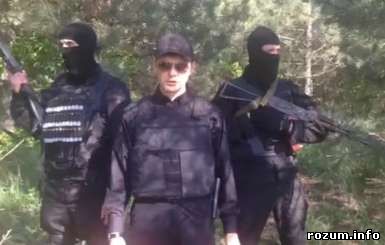 Overall, since the beginning of the ATO supporting the volunteer battalions and units of the regular army by the public persons has become the way of gaining the political dividends and recognition or raising one's rates before the election. The leader in this field and the very definition of patriotic populism is MP Oleg Liashko who was among the first politicians who started actively supporting the volunteer battalions (providing them with food, uniform, arms, equipment, vehicles, medical treatment, etc.), including "the little black men" or the activists of "Bratstvo"(Brotherhood). Some of the right-wingers (Igor Mosiychuk, Dmytro Linko) have become MPs of Liashko's "Radical Party," besides, he helped to release the political prisoners after Maidan. Overall, since the beginning of the ATO supporting the volunteer battalions and units of the regular army by the public persons has become the way of gaining the political dividends and recognition or raising one's rates before the election. The leader in this field and the very definition of patriotic populism is MP Oleg Liashko who was among the first politicians who started actively supporting the volunteer battalions (providing them with food, uniform, arms, equipment, vehicles, medical treatment, etc.), including "the little black men" or the activists of "Bratstvo"(Brotherhood). Some of the right-wingers (Igor Mosiychuk, Dmytro Linko) have become MPs of Liashko's "Radical Party," besides, he helped to release the political prisoners after Maidan.
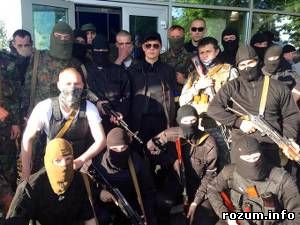 Since the very beginning it was clear that politicians gain more than volunteers who absolutely were not obliged to protect the political interests of their benefactors. Many criticized Liashko's theatrical self-promotion, but the vast majority of people viewed it pragmatically and claimed that if all Ukrainian politicians promoted themselves like Liashko (for instance, detainment of the pro-Russian separatist Klinchaev in Lugansk regional administration), the country would be already free. At the same time he has never been an official sponsor of the "Azov" battalion, that's why it's commander Andriy Biletsky could simultaneously criticize his political practice as clownish. Since the very beginning it was clear that politicians gain more than volunteers who absolutely were not obliged to protect the political interests of their benefactors. Many criticized Liashko's theatrical self-promotion, but the vast majority of people viewed it pragmatically and claimed that if all Ukrainian politicians promoted themselves like Liashko (for instance, detainment of the pro-Russian separatist Klinchaev in Lugansk regional administration), the country would be already free. At the same time he has never been an official sponsor of the "Azov" battalion, that's why it's commander Andriy Biletsky could simultaneously criticize his political practice as clownish.
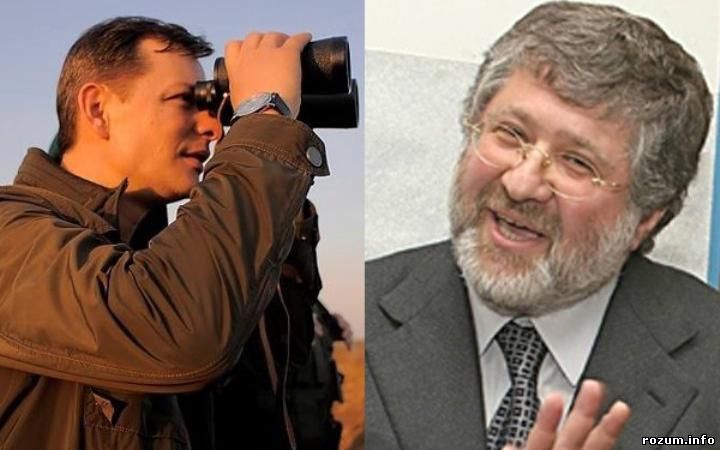 Moreover, public figures who supported the volunteer battalions as the political rivals often accused each other of self-promotion and taking advantage of war. For instance, Igor Mosiychuk, who at that time was Press Secretary of the "Azov" battalion, but has already established connections with Liashko's Radical Party, attacked Igor Kolomoisky along with Liashko and accused him of prolonging war, making money of war (selling petrol to the army at increased prices), and even selling arms to the enemy, as well as refusal to return 1,5 milliards of UAH to the state enterprise "UkrNafta" when Ukraine really needs them. From this point of view financial help of Kolomoisky to Ukrainian army was not so obvious and praiseworthy. Moreover, public figures who supported the volunteer battalions as the political rivals often accused each other of self-promotion and taking advantage of war. For instance, Igor Mosiychuk, who at that time was Press Secretary of the "Azov" battalion, but has already established connections with Liashko's Radical Party, attacked Igor Kolomoisky along with Liashko and accused him of prolonging war, making money of war (selling petrol to the army at increased prices), and even selling arms to the enemy, as well as refusal to return 1,5 milliards of UAH to the state enterprise "UkrNafta" when Ukraine really needs them. From this point of view financial help of Kolomoisky to Ukrainian army was not so obvious and praiseworthy.
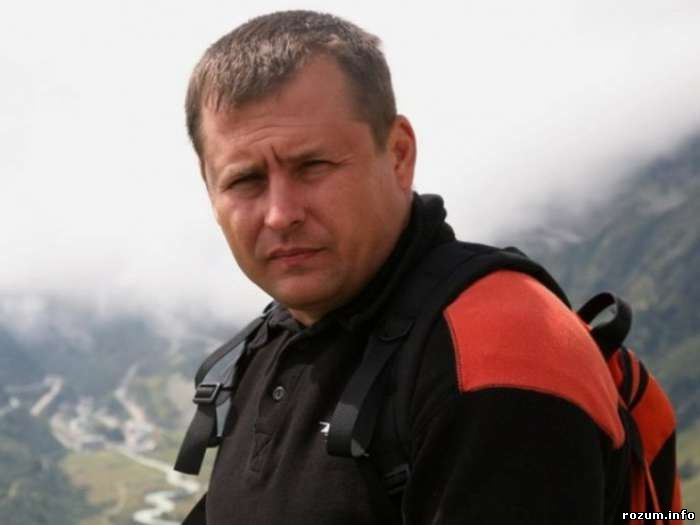 In turn, Borys Filatov accused Liashko of turning the war into his personal election campaign and said that after such statements Liashko should feed the "Azov" battalion, as well as repair the vehicles and establish military radio communication for the "Shakhtarsk" battalion himself. Yet all headings of the Kremlin's media reports about their quarell were as follows "Kolomoisky Stops Funding the "Azov" Battalion." Filatov also used this expression ("We stop funding the "Azov" and "Shakhtarsk" battalions"), but it was easy to figure out from his Facebook debates with Mosiychuk that he meant namely payment for food for a certain period of time. In turn, Borys Filatov accused Liashko of turning the war into his personal election campaign and said that after such statements Liashko should feed the "Azov" battalion, as well as repair the vehicles and establish military radio communication for the "Shakhtarsk" battalion himself. Yet all headings of the Kremlin's media reports about their quarell were as follows "Kolomoisky Stops Funding the "Azov" Battalion." Filatov also used this expression ("We stop funding the "Azov" and "Shakhtarsk" battalions"), but it was easy to figure out from his Facebook debates with Mosiychuk that he meant namely payment for food for a certain period of time.
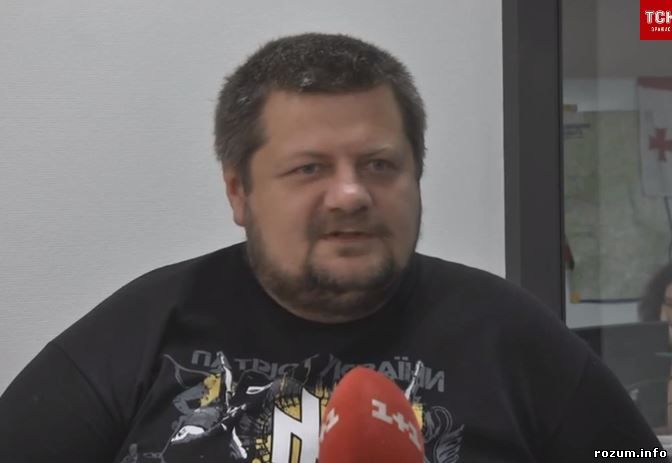 "I want to clarify: Kolomoisky has never funded the "Azov" battalion," commented Mosiychuk on Filatov's angry update. "Mosiychuk, should I send to you a food bill for staying in Berdyansk?" responded Filatov, meaning that they payed for the nutrition of the "Azov" battalion soldiers while they lived in Berdyansk, nothing more and on behalf of the entire administration of Dnipropetrovsk region that requires volunteers' help and would be the first to undergo the attack of pro-Russian saboteurs. He also forbade Mosiychuk entering Dnipropetrovsk region, after which the latter wished Filatov and Kolomoisky, so to speak, to enjoy each other's company in their region in accordance with their national peculiarities. In response to this harsh joke Filatov called Mosiychuk a Nazi bastard and said that he, as the pure Russian, would all the same hang with his bare hands the anti-Semites like Mosiychuk. The whole conversation may be found here: http://obozrevatel.com/politics/71935-filatov-otkazal-v-finansirovanii-vonyuchemu-natsistu.htm "I want to clarify: Kolomoisky has never funded the "Azov" battalion," commented Mosiychuk on Filatov's angry update. "Mosiychuk, should I send to you a food bill for staying in Berdyansk?" responded Filatov, meaning that they payed for the nutrition of the "Azov" battalion soldiers while they lived in Berdyansk, nothing more and on behalf of the entire administration of Dnipropetrovsk region that requires volunteers' help and would be the first to undergo the attack of pro-Russian saboteurs. He also forbade Mosiychuk entering Dnipropetrovsk region, after which the latter wished Filatov and Kolomoisky, so to speak, to enjoy each other's company in their region in accordance with their national peculiarities. In response to this harsh joke Filatov called Mosiychuk a Nazi bastard and said that he, as the pure Russian, would all the same hang with his bare hands the anti-Semites like Mosiychuk. The whole conversation may be found here: http://obozrevatel.com/politics/71935-filatov-otkazal-v-finansirovanii-vonyuchemu-natsistu.htm
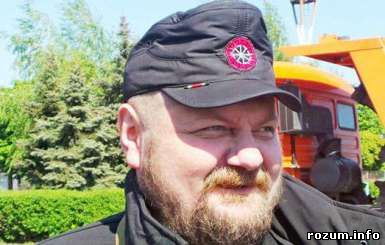 After this incident Igor Mosiychuk, in order not to stir up the further debates, resigned the post of the "Azov" battalion's Press Secretary, but some of his critical remarks turned out to be prophetic: Kolomoisky resigned as well because of the UkrNafta debt, which was appreciated by Mosiychuk. Currently he continues collaborating with "Radical Party," i.a. defends the rights of new political prisoners and the foreign volunteers. After this incident Igor Mosiychuk, in order not to stir up the further debates, resigned the post of the "Azov" battalion's Press Secretary, but some of his critical remarks turned out to be prophetic: Kolomoisky resigned as well because of the UkrNafta debt, which was appreciated by Mosiychuk. Currently he continues collaborating with "Radical Party," i.a. defends the rights of new political prisoners and the foreign volunteers.
Besides, both Mosiychuk and Oleg Odnorozhenko, the "Azov" regiment commander for the personnel work criticized "teaching Ukrainians how to defend their homeland for [foreign] money" by Igor Kolomoisky who half-seriously, half-jokingly promised to pay Ukrainian citizens for each captured separatist or his weapons. Andriy Biletsky, who was on quite friendly terms with Filatov, also refused to admit that Kolomoisky has ever funded the "Azov" battalion and considered the quarrel of Mosiychuk and Filatov very odd and untimely.
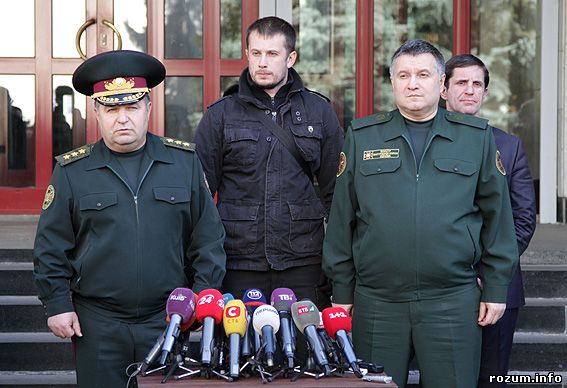 Although the "Azov" regiment of the National Guard of Ukraine currently receives the considerable state support, especially by the Ministry of Internal Affairs headed by Arsen Avakov, which after the resignation of Kolomoisky gives birth to the similar paid rumors about the "private neo-Nazi army of Avakov," it is still largely funded by Ukrainian citizens, small and medium business owned by Ukrainian patriots. Although the "Azov" regiment of the National Guard of Ukraine currently receives the considerable state support, especially by the Ministry of Internal Affairs headed by Arsen Avakov, which after the resignation of Kolomoisky gives birth to the similar paid rumors about the "private neo-Nazi army of Avakov," it is still largely funded by Ukrainian citizens, small and medium business owned by Ukrainian patriots.
 Recently the "Azov" regiment won the case against the opponents who wanted to continue making money off the destroyed Soviet plant "Atek" as an office center; instead, the "Azov" regiment made it a national property, repairs there military vehicles by its own means and prepares the new groups of the recruits who regularly depart from its territory into the zone of ATO. Besides, the "Azov" regiment has the official bank accounts to the attention of all who would like to contribute to its international cooperation and construction of the Foreign Legion, for the financial abilities of the state and Ukrainian people are limited. Recently the "Azov" regiment won the case against the opponents who wanted to continue making money off the destroyed Soviet plant "Atek" as an office center; instead, the "Azov" regiment made it a national property, repairs there military vehicles by its own means and prepares the new groups of the recruits who regularly depart from its territory into the zone of ATO. Besides, the "Azov" regiment has the official bank accounts to the attention of all who would like to contribute to its international cooperation and construction of the Foreign Legion, for the financial abilities of the state and Ukrainian people are limited.
To sum up, the rumors about the Western political and financial aid against the background of the growing political influence of the "Azov" regiment in Ukraine which develops its Civil Corps in all Ukrainian cities, recaptures the state enterprises, is firmly against selling the agricultural land to the foreigners, openly aims at the establishment of Baltic-Black Sea alliance with Ukraine as its regional leader instead of eurointegration, etc. is nothing but a political order of the Kremlin and its Western allies, which proves similarity of their anti-Ukrainian rhetoric used in the recent statement of the US congressmen on the "Azov" regiment.
|



